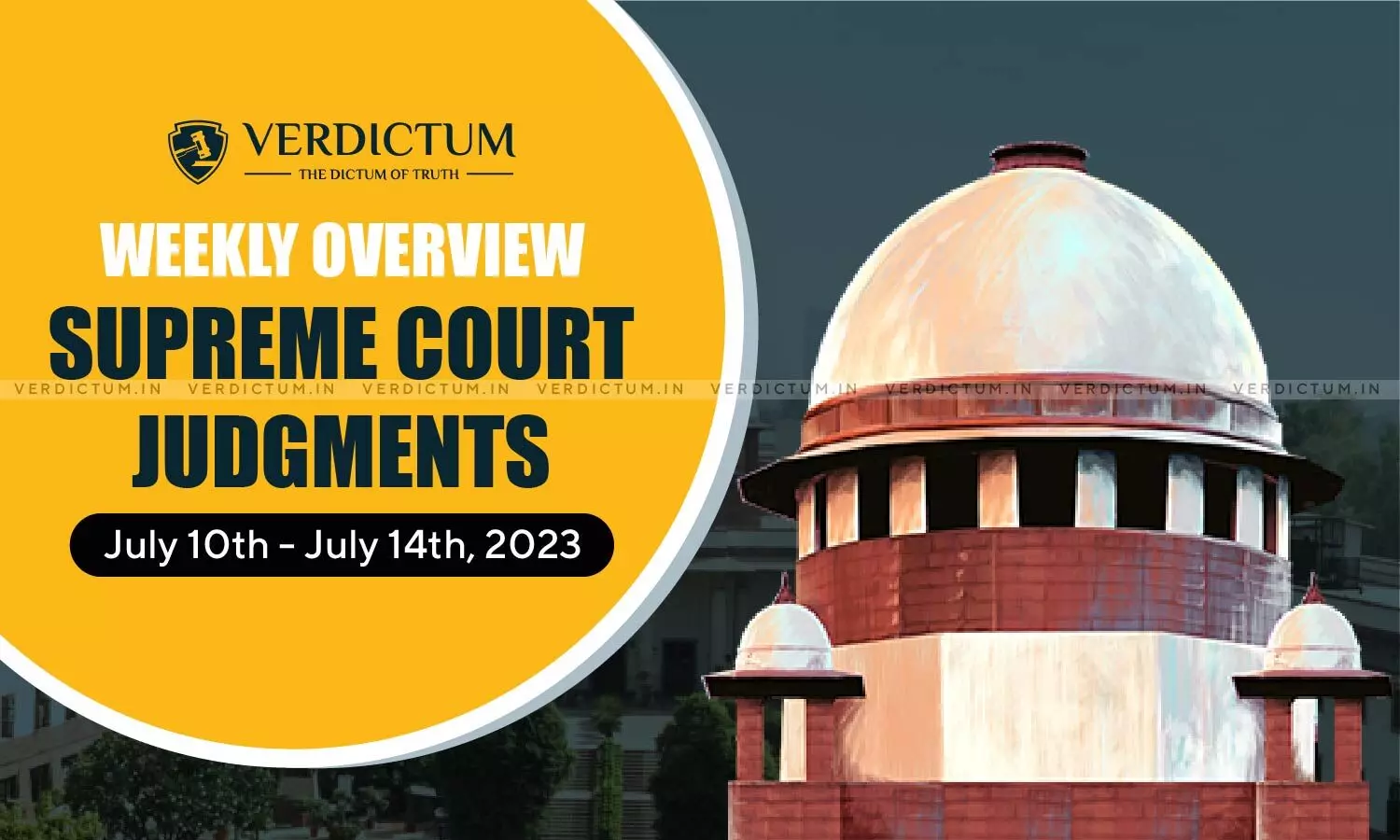
Weekly Overview| Supreme Court Judgments: July 10 – July 14, 2023
 |
|1) Statutory restriction on suit during specified period for eviction does not bar filing of suit: SC affirms order to evict tenant in 38-year-old case
The Court held that limitation of five years specified in Section 14(3) of the Rajasthan Premises (Control of Rent and Eviction) Act, 1950 does not bar the institution of the suit itself when the suit was decided after said five years. It held, "We opine that this passage of time beyond the period of five years would wash away the initial impediment against the suit".
The Court was dealing with an appeal challenging the order of a Division Bench of the High Court which had taken an opposite view, on a reference by a single judge of the Court. It also directed the tenant to vacate the property, instead of remitting the matter back to the High Court in view of the long pendency of the case.
Cause Title- Ravi Khandelwal v. M/S Taluka Stores
Date of Judgment- July 11, 2023
Coram- Justice Sanjay Kishan Kaul and Justice Ahsanuddin Amanullah
2) Amendment to clause (d) of S. 25 CVC Act & sub-section 1 of S. 4b DSPE Act not unconstitutional: SC while declaring extension of ED director's 2 yrs tenure illegal
The Court held that the amendment to clause (d) of Section 25 of the Central Vigilance Commission Act (CVC Act) and to sub-section (1) of Section 4B of the Delhi Special Police Establishment Act (DSPE Act) is not unconstitutional. It further said that there is no reason to hold that the amendment to Fundamental Rules, 1922 is impermissible in law and hence declared the extension of the Enforcement Directorate Director's 2 years tenure as illegal.
A batch of writ petitions was filed seeking a writ, order, or directions in the nature of certiorari for quashing the order passed by the Centre for further extension of the tenure of the respondent. All the petitions challenged the validity of the Central Vigilance Commission (Amendment) Act, 2021, the Delhi Special Police Establishment (Amendment) Act, 2021, and the Fundamental (Amendment) Rules, 2021.
Cause Title- Jaya Thakur v. Union of India & Ors.
Date of Judgment- July 11, 2023
Coram- Justice B.R. Gavai, Justice Vikram Nath, and Justice Sanjay Karol
3) A classic case wherein litigant misled courts & authorities at different levels to put life into his stale claim: SC allows State’s appeal
The Court allowed an appeal filed by the State of Orissa in a case relating to the Orissa Survey & Settlement Act, 1958. It said that it is a classic case wherein the litigant misled the courts and authorities at different levels to put life into his stale claim.
In this case, the order passed by the Orissa High Court was under challenge via an appeal. A writ petition was filed by Laxmi Narayan Das (dead) through legal representatives i.e., the respondents challenging the order passed by the Settlement Officer. The plea was filed more than 18 years after the said order was passed and the grievance raised was that the objections filed by the writ petitioners during the course of settlement were not considered by the authority concerned and the land was recorded in the name of General Administration Department (GAD) and a liberty was granted to the writ petitioners to file representation to the GAD.
Cause Title- State of Orissa & Anr. v. Laxmi Narayan Das (Dead) thr. LRs & Ors.
Date of Judgment- July 12, 2023
Coram- Justice Abhay S. Oka and Justice Rajesh Bindal
4) Motor vehicles cases must be decided on basis of preponderance of possibilities rather than proof beyond reasonable doubt
The Court allowed a Criminal Appeal challenging an impugned order, wherein the High Court quashed the final report of a road accident. It ruled that the principle of ‘res ispa loquitor’ applies to the facts and that the motor vehicle cases should be considered on the basis of preponderance of the possibilities rather than on the basis of proof beyond a reasonable doubt.
In this case, an FIR was registered in the police station against the Petitioner’s son under Sections 279 and 304A of the Indian Penal Code (IPC). The Petitioner's son was driving a car with his friends when they were involved in a collision with a lorry, the driver of the lorry was driving rashly and negligently. The collision led to the death of the Petitioner's son and his friends and hence a claim petition was filed seeking compensation, but the Assistant Commissioner of Police filed the said FIR against the Petitioner's son for abetting the accident.
Cause Title- Mathew Alexander v Mohammed Shafi and Anr.
Date of Judgment- July 13, 2023
Coram- Justice B.V. Nagarathna and Justice Prashant Kumar Mishra
5) Land Acquisition Act| If acquisition is valid under 1894 Act, compensation cannot be based on 2013 Act
The Court while dealing with an appeal challenging the compensation granted to the Respondents under the Land Acquisition Act, 2013 (2013 Act) set aside the decision of the Delhi High Court and said that the compensation will be calculated in terms of the Land Acquisition Act, 1894 (1894 Act).
The land of the Respondent was acquired by the Appellant under the provisions of the 1894 Act. The Respondents challenged the acquisition notification at the Delhi High Court which was subsequently dismissed. Following this, the Appellants acquired the land in 2006.
Cause Title- Delhi Development Authority v. Jagan Singh & Ors.
Date of Judgment- July 13, 2023
Coram- Justice Abhay S. Oka and Justice Sanjay Karol